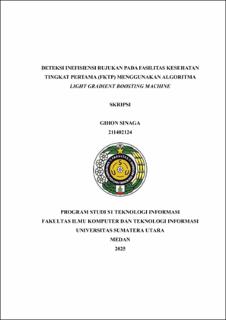| dc.description.abstract | The referral system within Indonesia’s National Health Insurance (JKN) program is designed to optimize the role of Primary Healthcare Facilities (FKTP) as the initial gatekeeper of medical services. However, in practice, inefficiencies remain prevalent, where patients are referred to advanced care facilities even though their conditions could be managed at FKTP level. This study aims to detect such inefficiencies by developing a classification model using the Light Gradient Boosting Machine (LightGBM) algorithm. The dataset utilized comprises FKTP visit records from 2022 and 2023, sourced from BPJS Kesehatan, with over six million rows containing facility, service, and diagnostic variables. The research workflow includes data cleaning, feature engineering, label encoding, and oversampling of the training data to address class imbalance. The LightGBM model was trained and evaluated using accuracy, precision, recall, and F1-score metrics to assess its ability to classify patient discharge status as either “Outpatient Treatment” or “Referral.” Test results show that the model can effectively detect patterns of inefficient referrals with satisfactory performance. These findings may serve as a basis for policy decisions by BPJS and healthcare providers to enhance referral system efficiency and reduce unnecessary healthcare expenditure. | en_US |


